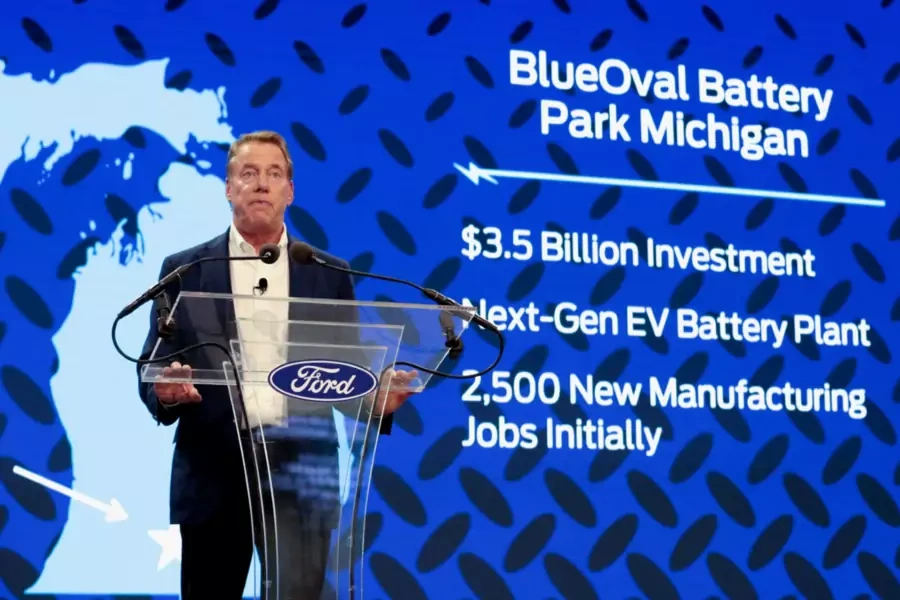Ford-CATL Partnership Illustrates the Challenge of Decoupling EV Supply Chains

Despite an increasingly restrictive commercial environment between the United States and China, some U.S. companies are doubling down on cooperation with their Chinese counterparts, even in technology sectors. In one of the highest visibility instances of this trend, Ford Motor Co. announced in February a plan to cooperate with Chinese battery manufacturer Contemporary Amperex Technology Co. Ltd. (CATL) to build an electric vehicle (EV) battery factory in Michigan.
The structure of the Ford-CATL partnership is unlike those of traditional joint ventures. Ford will control a 100 -percent ownership stake in the plant and license the lithium ferrous phosphate (LFP) battery technology from CATL. This unconventional equity structure could make Ford eligible to receive benefits from the Biden administration’s Inflation Reduction Act, which promises U.S. automakers federal subsidies in exchange for domestic production of EV batteries.
More on:
To be sure, the Ford-CATL deal is part of the larger story that there is in fact much less decoupling between the two economies than headlines would lean one to believe. Macro-level statistics suggest that geopolitical tensions have not deterred U.S. commercial actors from continuing to deal with China. New data released in February by the U.S. Department of Commerce reveals that both the import of goods from China to the United States and export of goods from the United States to China increased from 2021 to 2022, totaling a cumulative $690.6 billion in 2022—a record high level. Investors are similarly bullish on China, with, for example, Goldman Sachs’ overseas hedge fund clients’ positions in China also reaching a record high.
EV technology would also seem to be somewhat unique in the U.S.-China technology cold war. There are strong political and market forces that made EV different, at least until recently. The Biden administration wants to boost the domestic market, and there may be parts of the government who still hope to work with Beijing on shared climate goals.
Moreover, there are many advantages unique to China’s EV landscape that makes it a boon to U.S. companies. For one, China’s EV market is larger and has grown at a faster pace than in other countries. In 2022, 6.8 million alternative energy vehicles were sold in China compared to roughly 800,000 sold in the United States. A slew of government policies dating back to 2009—including subsidies, tax breaks, and procurement contracts—enabled Chinese automakers to quickly mature and refine their EV-related technologies while drastically increasing manufacturing scale. Chinese policymakers have also provided such benefits to foreign EV manufacturers such as Tesla, which has intensified competition and spurred increased innovation among domestic brands.
Chinese companies also dominate the battery technologies that U.S. automakers want. LFP batteries, which are the focus of the Ford-CATL partnership, are cheaper and easier to produce than the nickel cobalt aluminum (NCA) and nickel manganese cobalt (NMC) batteries commonly used in the United States and Europe. The prospect of LFP batteries is already causing U.S. automakers to transition to the technology, and LFP batteries are projected to seize a majority market share in coming years. With Chinese battery makers commanding of over 60 percent of the world’s overall EV battery market and leading in the development of LFP, it is not surprising that U.S. automakers would feel compelled to partner with Chinese manufacturers.
In addition to its grip on LFP technology, China’s command over other components of the EV supply chain is another challenge to U.S. decoupling efforts. While China does not control most of the world’s reserves for mining critical minerals, it does hold substantial leads in material processing and refining, cell component and battery manufacturing, and EV production. And China continues to prioritize securing and extending its lead on the EV supply chain. In terms of plans to expand manufacturing of EV battery components, China consists of a respective 98 percent and 93 percent of the world’s announced manufacturing capacity expansion plans of anode and cathode materials to 2030.
More on:
There are growing signs, however, that proponents of decoupling are turning their attention to these supply chains and are especially worried that China has developed asymmetric advantages to dominate the marketplace. There has been a bipartisan wave of pushback to the Ford-CATL deal from U.S. officials including Florida Senator Marco Rubio, Virginia Senator Mark Warner, and Virginia Governor Glenn Youngkin. China itself has called for additional scrutiny of the deal, stemming from concerns that Ford might be able to gain access to sensitive technologies as a result of the partnership.
The calls to stall and scrutinize the proposed partnership illustrate how political forces have come to affect commercial dealings between the United States and China. The Ford-CATL partnership may turn out to be a bellwether of U.S.-China cooperation in the EV space—a symbol of how difficult it is for the United States to balance the interests of private industry with the desire to reduce dependence on Chinese technologies.
Seaton Huang is a research associate for the Asia Studies Program at the Council on Foreign Relations.
 Online Store
Online Store